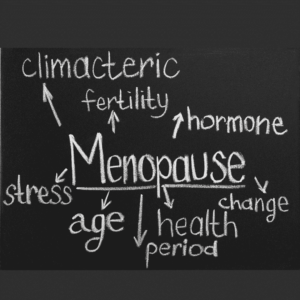What is Menopause? Peri-menopause? How to deal with it?
Unlock a deeper understanding of menopause and perimenopause, and learn how to care for yourself during these phases. Is a doctor’s consultation necessary? Find out the key insights to handle these stages that every woman experiences – you, your sister, your mother, or your wife. Join Dr. Vasudha M. Sharma’s online session for invaluable guidance. Don’t miss this opportunity

Menopause signifies the conclusion of menstrual cycles, often describing the transitions occurring just before or after your periods cease, symbolizing the conclusion of your fertile years. Typically, menopause occurs around the age of 50.
Causes of Menopause
Women are born with a finite supply of eggs, which reside within their ovaries. These ovaries are responsible for producing the hormones estrogen and progesterone, governing the menstrual cycle and the release of eggs (ovulation). Menopause occurs when the ovaries cease to release an egg each month, leading to the cessation of menstruation. Menopause is a natural aspect of the aging process, typically occurring after the age of 40. However, some women may experience early menopause due to various factors. Surgical interventions, like the removal of ovaries during a hysterectomy, or ovarian damage from treatments like chemotherapy, can lead to early menopause. When menopause occurs before the age of 40, regardless of the cause, it is referred to as premature menopause.
Symptoms of Menopause
As menopause approaches, many women start experiencing signs like hot flashes, which cause sudden warmth, blushing, rapid heartbeats, and sweating in the upper body. These can vary from mild to severe.
Other menopausal symptoms include:
- Irregular or missed periods
- Dryness in the vaginal area
- Breast tenderness
- Increased frequency of urination
- Sleep disturbances
- Emotional shifts
- Dry skin, eyes, or mouth
- Fatigue
- Feelings of sadness
- Irritability
- Headaches
- Joint and muscle discomfort
- Weight changes
- Hair thinning
- Altered sex drive
These are common signs of menopause.
What happens during peri-menopause?
Natural menopause occurs without any medical or surgical intervention and progresses gradually through three stages:
Perimenopause: Typically beginning several years before menopause, during this phase, your ovaries gradually produce less estrogen. Perimenopause continues until menopause, the point when your ovaries no longer release eggs. In the last 1 to 2 years of this stage, estrogen levels decline more rapidly, leading to the onset of menopausal symptoms in many women.
Menopause: Menopause is officially recognized when a year has passed since your last menstrual period. At this point, your ovaries have ceased releasing eggs and producing most of their estrogen.
Postmenopause: These are the years following menopause. Symptoms like hot flashes and night sweats often decrease during this phase. However, the health risks associated with estrogen loss tend to increase as you age.
Explore beyond the basics of menopause and perimenopause to learn how to navigate and care for yourself during these phases.
Schedule
Faculty Details
Date- 14th October 2023
Time- 12 to 1pm (Saturday)
Registration fee-
Indian Nationals – 99/-
Foreign Nationals – $ 3
Dr Vasudha M Sharma
BAMS,MSC, PhD





